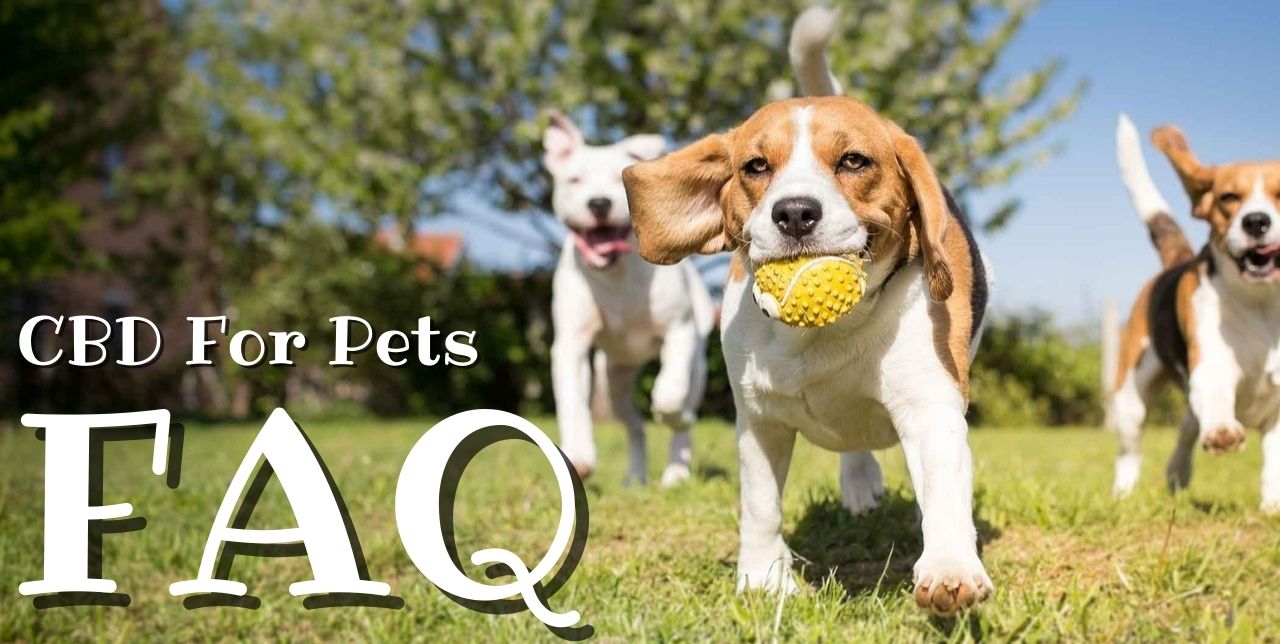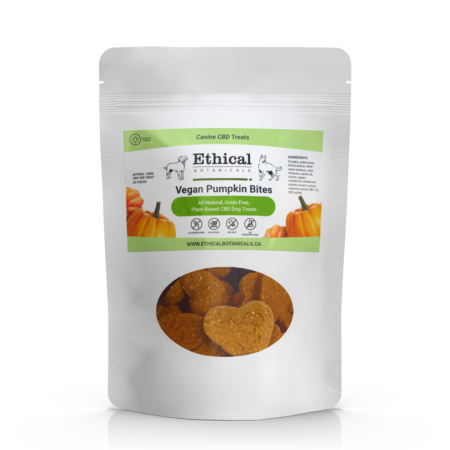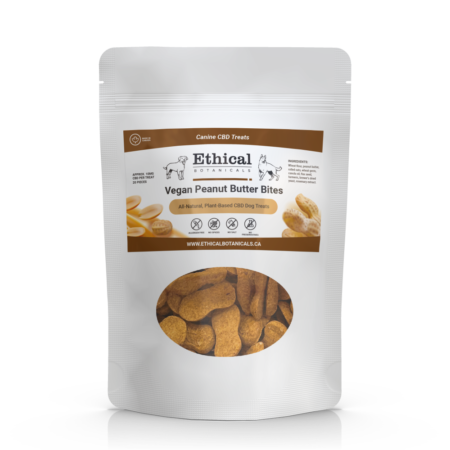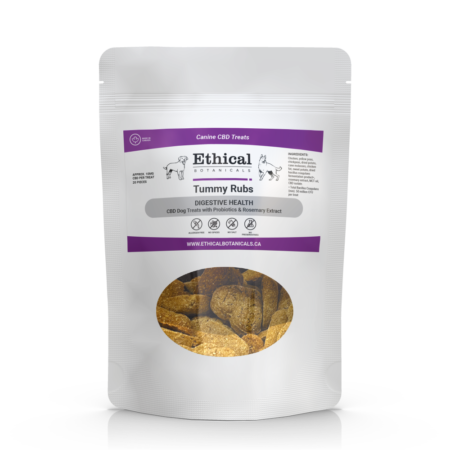CBD For Pets
FAQ

CBD FAQ: The Basics
Though humans have used cannabis—from which cannabidiol (CBD) is derived—as medicine for over 5000 years, the scientific community only identified CBD as a chemical compound in 1940.
CBD is a cannabinoid. Cannabinoids are a whole family of compounds produced by cannabis plants; 113 of which have already been identified. The most famous of cannabinoids is, of course, the THC that gets you “high.”
CBD is extracted from cannabis plants too—but usually from hemp strains which produce far more CBD than THC. Unlike THC, CBD cannot get you or your pets “high.”
Amazingly, our bodies—and our pets’ bodies—produce cannabinoids too, called endocannabinoids, which act as messengers in a body-wide system called the endocannabinoid system (ECS). All vertebrates have an ECS. The ECS features a number of receptors, including CB1 and CB2, which CBD interacts with thanks to CBD’s molecular resemblance to our own endogenously-produced endocannabinoids. When CBD interacts with our endocannabinoid systems, it precipitates a variety of effects, such as reducing inflammation, dialing down overactive immune responses, lowering stress and promoting homeostasis. Those four broad effects alone have therapeutic implications for dozens of diseases and conditions.
The ECS is a very important bodily system that is rarely discussed, but that’s changing thanks to the latest research. The ECS regulates a broad number of physical processes, including how we perceive pain, hunger and stress. It also plays an important role in regulating mood, immune activity, glucose metabolism, blood pressure, intestinal function, bone density and more. The reason CBD is often touted as a panacea or “cure-all” is because it interacts with the ECS—which regulates or affects nearly every other system in our bodies.
Though the science on CBD is still preliminary, recent studies show that CBD influences other important compounds produced by our bodies, such as adenosine—which plays a major role in our waking-sleeping cycle; serotonin—which plays an important part in regulating stress, mood and happiness; as well as vanilloid—which plays a role in the modulation of pain.
Cannabinoids are fatty compounds produced by cannabis plants. The cannabinoid most people know about is THC, which is produced in abundance by marijuana plants and produces psychoactive effects commonly referred to as a “high.”
The word “cannabinoid” is somewhat generic. More specifically, cannabinoids produced by cannabis plants are referred to as phytocannabinoids, while those produced by our own bodies (and the bodies of all vertebrates) are called endocannabinoids.
So far, scientists have identified at least 113 kinds of phytocannabinoids produced by cannabis plants. Thanks to a phytocannabinoid’s molecular resemblance to endocannabinoids, cannabis-derived cannabinoids can interact with receptors in human and animal endocannabinoid systems through various receptors, including CB1 and CB2.
The endocannabinoid system (ECS) is still poorly understood, but preliminary research indicates it is a tremendously important system.
The ECS is distributed broadly throughout the body, and is made up of various endocannabinoids and receptors, including the two primary receptors CB1 and CB2.
CB1 receptors are distributed in the central nervous system and the peripheral nervous system, while CB2 receptors can be found in the brain, immune system, gastrointestinal system and peripheral nervous system.
To date, scientists have found evidence that the ECS may play a role in a host of cognitive and physiological processes including immune system activities, pain-sensation, memory, mood, fertility, pregnancy, pre-and-postnatal development, and mediating the pharmacological effects of various cannabinoids.
But that’s not all. The ECS is also thought to play a vital role in numerous neural functions, including learning and memory, movement and motor coordination, emotion and motivation, addiction, and the modulation of pain, and more besides.
The ECS is also thought to play an important role in promoting homeostasis: the condition of optimal functioning for living organisms.
CBD is fully legal to purchase in both the US and Canada as of 2018. Though the regulatory regimes differ in each country, there are no prohibitions on purchasing CBD products in either the US or Canada and hemp can be cultivated legally.
Here at CBD Oil for Dogs, we use only lab-tested, hemp-derived CBD of the highest quality to ensure our products are consistent, safe, reliable and THC-free.
Yes you can!
Prescriptions are not required to buy our products in either the US or Canada. In accordance with the 2018 Farm Bill and Canada’s Cannabis Act, our CBD is derived from hemp and processed to produce pure CBD isolate, which is THC-free.
Before trying CBD for the first time, we advise that you speak with your veterinarian first. Note this: not all veterinarians are allowed to discuss using CBD for dogs. Call or email your vet first to find out if they are open to discussing CBD for your pet.
CBD and Pets: Safety
Absolutely not.
Here at CBD Oil For Dogs, we only pure CBD isolate in our products, and they are all 3rd party lab-tested to ensure they do not contain THC. For anyone new to cannabis-based medicines, THC is the compound that gets people “high.” CBD cannot get you or your pets “high” as it doesn’t produce the same psychoactive effects. No highs here! Just plant-based medicine!
No.
CBD is non-toxic and dogs tolerate large doses of CBD “well” according to research published in Frontiers in Veterinary Science.
To date, there have been no reported instances of overdose from CBD in either animals or humans. To ensure our products are safe and reliable for our pets, CBD Oil For Dogs uses only 3rd party lab-tested CBD isolate.
Follow common dosage guidelines, or advice from your veterinarian, and your dog should be able to use CBD regularly without issue.
Pet parents with cats and dogs have been using CBD successfully for years now, but they aren’t the only ones. CBD has been administered to horses, even elephants (under the supervision of zoo veterinarians of course).
If your pet is a mammal, it is possible that CBD can help them with their health issues. However, the research on CBD’s effects on anything but mice is scant. If you are thinking of trying CBD for your pet, we strongly suggest you consult your veterinarian first.
Recommended reading:
There has been much interest shown in CBD by the veterinary community. However, there are vets out there who are prevented by corporate rules from speaking about CBD in the veterinarian’s office.
As a result, there are many vets out there that support pet parents interested in using CBD, and vets that recommend trying CBD for various conditions, but some cannot do so. Different veterinarians may even endorse particular products or brands. When veterinarians talk about buying CBD products they usually recommend that pet parents follow the general guidelines below:
- Check the brand’s reputation. Check their Google ratings, Facebook ratings and see if anyone’s had any serious issues with their brand.
- Check the ingredients. Make sure all ingredients are pet-safe and contain no harmful preservatives, junky filler or allergens.
- Ask to see 3rd party lab tests. 3rd-party lab tests are also referred to as COAs—certificates of analysis, which will show whether there is the correct dose of CBD in the product and show whether there are unsafe levels of any contaminants like solvents, heavy metals, pesticides, etc…
CBD products are veterinarian-formulated and third-party, ISO-certified lab-tested to provide your pet with the alternative options they need to support their overall health and wellbeing. We always recommend talking to your veterinarian before adding any new products to your pet’s regimen.
If your pet is currently on medication, we advise that you speak to your veterinarian first, prior to administering any CBD to your pet. Though CBD is non-toxic and easy on the body, it can interfere with the metabolization of certain drugs in the same way that grapefruit does. Not every drug carries a grapefruit warning, but speak to your vet first to make sure.
At CBDOil4Dogs.com we love carrying pet-safe products of the highest quality. To ensure our products are pet-safe we use only 100% natural ingredients to avoid provoking food allergies.
Our products contain no nuts, citrus, chocolates or other allergens. Products sold on our site generally include only the following ingredients: MCT Oil, CBD isolate, all-natural smoked meats.
As a general rule, pets with sensitivities should be given tinctures and not treats—especially those made with highly-processed food.
CBD and Pets: Usage
There are many options out there nowadays! Pets can be given CBD using tinctures like Bacon-Flavored CBD Oil for Dogs, treats, and even topical creams, balms and healing ointments.
CBD oils can be dropped on your dog’s favorite kibble or snack, with some dogs and cats even preferring to lick it straight out of the dropper. Another method people use is to drop the proper dose into a spoon and then let their pet lick the spoon. Oils can make the throat feel dry or itchy, so make sure your pet’s water bowl is full, or give them a treat afterwards.
CBD treats are convenient as they have already been pre-dosed. Check the serving size and dosage information so you are sure you know how much CBD you are administering to your pet. Our treats are dosed per piece. You can find the information about CBD dose per piece on our product packaging.
CBD topicals are used in the same way as other creams, lightly massaged into the target area.
For each individual product, remember to follow any instructions on product packaging.
CBD’s effects can’t be felt as immediately as some prescription drugs, and usually take time to become apparent. This is because it takes time for CBD to build up in the system with regular use. Though you may feel some effects in the first week, CBD will start being at its most effective after a month of use, or so.
Up to you.
Chews are convenient, but the CBD must pass through the digestive tract, and can take an hour or two to start taking effect.
CBD tinctures are absorbed into the bloodstream through blood vessels near surfaces of soft tissues in your pet’s mouth and throat, thereby by-passing the digestive tract. Tinctures generally take 30-60 minutes to start taking effect.
CBD topicals also bypass the digestive tract and target CBD receptors just under the skin. Skin isn’t very porous to CBD, so only some of the CBD can actually get through to interact with CBD receptors.
This question is really about CBD Oil Dosage. We recommend you talk to your veterinarian about dosage for your pet, they’ll have the best advice. You’ll also find helpful information in our articles on CBD dosage:
CBD Oil Dosage: How Much Should I Give My Dog?
CBD Oil For Cats; Can It Help?
The first thing you want to ask yourself is
“How many milligrams of CBD am I trying to give my pet?”
Once you have that figured out, you can decide what serving sizes will be appropriate for your pet by checking product labels. If your target dosage is approximately 3mg, for example, you could find the following dosage information for CBD Oil for Pets 250mg:
250 mg Bottle – 8.3 mg of CBD per full dropper (1ml)
It’ll be a bit inexact, but if you give your pet around 1/3 of a dropper, you should be giving your pet 2.5-3mg of CBD. Well within the target range.
CBD is still an inexact science and there are no FDA-approved dosage recommendations yet. Finding the best dose for your pet will involve a process of experimentation.
The general rule is “Start low, go slow.” Begin with a low dose and only increase it incrementally after waiting at least a week. More CBD isn’t always better, so observe your pet closely during the first month and keep a journal of your observations and the dosages administered, EG
- week 1: 3mg dosage
- week 2: 5mg dosage
- week 3: 7mg dosage
- week 4: 9mg dosage
After a month, look back at your notes. Try to determine which week/dose your pet appeared happiest and most comfortable. Start that dose for a month and continue. Pets, like people can build tolerance to CBD, so it will be necessary to increase the dose over time, but do so incrementally.
For CBD to be most effective, it should be used regularly over the long-term. Currently, CBD is usually taken once or twice a day, either in the morning around/before breakfast, an hour before sleep, or both.
A regular CBD routine is what will get you the best results.
You certainly can—so long as you’re always paying attention to administering the right dosage.
Remember, more CBD isn’t necessarily better. Follow a veterinarian’s recommendations or use the “Start Low, Go Slow” method and find the dose that best suits your pet.
You can find more information on CBD oil dosage for pets in the following articles:
The answer to this question depends on how you’ve administered the CBD—tincture, treat or topical; as well a pet’s age, weight, tolerance and other unique factors.
Generally speaking, the effects of a single dose of CBD could be felt for anywhere from 4-12hrs.
Product Information
Here at CBD Oil For Dogs, we love to make quality products using the best ingredients!
Our tinctures are made with certified organic food-grade MCT oil and pure CBD isolate, 100% THC-free. Flavored tinctures are naturally-flavored and pet-safe.
Our treats are made with all-natural smoked meats and contain no other ingredients save CBD isolate and MCT oil.
All our products have been lab-tested by a 3rd-party lab to ensure they are safe and reliable.
All our products have been tested for safety and dosage by approved 3rd-party labs. You can find the Certificates of Analysis for each product on its product page.
CBD oil has a long shelf-life, but proper storage of any product always helps.
Store CBD oils in a cool, dry place and don’t expose them to constant light or heat.
The same goes for canine CBD treats, but after the seal on product packaging has been broken, store your canine CBD treats in the fridge.
Well stored tinctures can have a shelf life of several years, losing potency at a rate of approximately 1-2% per year.
Our smoked meat canine CBD treats have a shelf life of 6 months. Check packaging for Best-by dates.
We pride ourselves on 5-star service that puts the customer first.
If for any reason, you are not satisfied with any products purchased on the CBDOil4Dogs.com just contact us within 30 days, return the product, and we’ll give you an industry-leading 110% refund, no questions asked.


